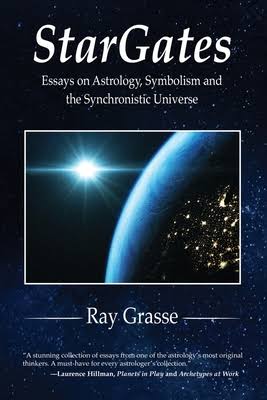This collection of thirty-six essays showcases Grasse’s shorter works both published and unpublished, and provide a contrast to his five books on single topics. The breadth and depth of material show the author’s progression of thoughts over time, although the pieces aren’t presented in chronological order.
Some of the topics chosen for inclusion are planetary portals, elevated planets, lunar aspects, free will, Saturn, the role of intuition in astrology, the seventh house, Planet X, stationing aspects, the US Pluto return, modern versus ancient astrology, dignities, old versus new sign rulers, yugas, the pandemic, the first moon landing, and the theory of correspondences. Quirkier pieces include “Future Shock: Contemplating Uranus’s Next Return to Its Discovery Degree” and “Astrology of the Weird: Strange Lights Over Phoenix.” It’s an astrological smorgasbord of topics.
Grasse is at his best when he discusses pop culture and planetary confluences, linking specific cultural trends with important slow planet conjunctions and aspects as in the title essay “StarGates: Planetary Portals and Windows in Time.” This well-developed essay appeared in Dell Horoscope Magazine in November-December 2019. “Decoding the Most Elevated Planet in the Horoscope” (pp 32-54) is another thoroughly developed topic that should get more discussion than it does. Each planet is examined for its potential as an elevated planet in a birth chart. Many examples are given for each planet (although no charts are included in the text). This article appeared in The Mountain Astrologer in the February-March 2018 issue.
This collection includes a few three to five-page musings like “It’s Nothing Personal” (pp 130-132), a short reflection on helping clients through difficult transits. This is good advice coming from a seasoned astrologer, but again, it’s not something that appears in pedagogic texts. A number of Grasse’s topics might be mentioned in instructional texts but get short shrift. Pieces within this collection fill in some of the gaps with an intelligent discussion of techniques, factors to consider, or an overview of how different planets or signs perform in different circumstances. The essays that offer this type of information make the text valuable for intermediate astrologers who grasp the language and the theory but haven’t done quite enough chart reading to connect all the dots. The endnotes contain all of the citations and extra remarks from the various essays.
StarGates demonstrates the author’s wide ranging curiosity and an urge to explore and research diverse subjects. A reader may or may not want to read every single article, but there’s something for everyone and much of value to developing astrologers. It is formatted in a clean, legible font. This book is recommended for intermediate astrologers who will benefit from the instructional articles, for all astrologers for the unusual topics that simply can’t be found elsewhere as well as the charming short, thought-provoking musings. Very few astrological writers could assemble a text like this. It’s good to see one that represents what’s possible for a person who has spent a great deal of his life dedicated to astrology.
~Review by Elizabeth Hazel
Author: Ray Grasse
2020, Inner Eye Publications
331 pages, $42.60 pb, Kindle $11.99
StarGates: Essays on Astrology, Symbolism and the Synchronistic Universe

©
2010 - 2025
Facing North
